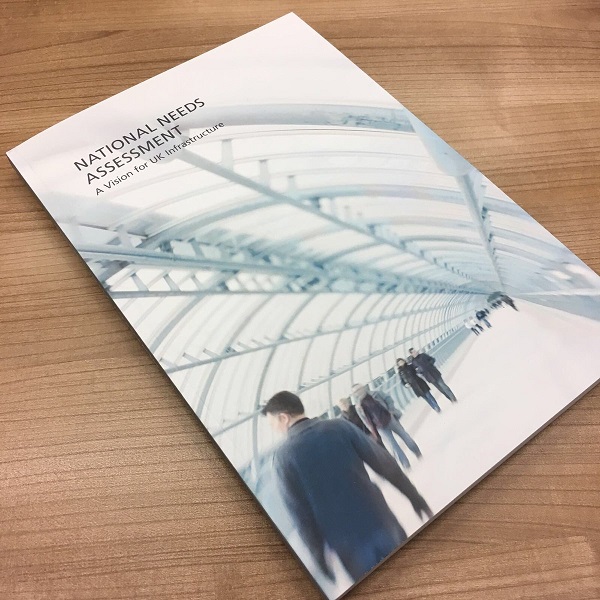National Needs Assessment NNA
On 19 October 2016, the National Needs Assessment (NNA) for UK infrastructure was launched following an assessment lasting 15 months in which a wide range of industry experts, investors, environmental, legal and professional bodies, and politicians were engaged.
It was written by Atkins, ICE and ITRC, and the project team included Atkins, ICE, ITRC, KPMG and Pinsent Masons.
The NNA, the first of its kind, outlines the changing demands on the UK’s infrastructure and discusses the steps necessary to create a national system that is ‘efficient, affordable and sustainable’, and delivers on needs until 2050. The report provides a blueprint for an assessment by the government-backed National Infrastructure Commission, due to be published in 2018.
The vision presented by the NNA is one of a nation with balanced economic growth, thriving communities and a low carbon future.
In order to create a stable environment for long-term investments, it suggests a diverse mix of electricity generation based on nuclear, renewables, gas and interconnectors, such as that set out by the Committee on Climate Change:
- 20-25% nuclear.
- 35-40% renewable.
- 25-30% Combined Cycle Gas Turbine.
- 10% interconnection.
A series of recommendations are made to develop infrastructure that will position the UK as an innovative global trading nation in the face of considerable challenges such as climate change and population growth.
Key findings from the report include:
- There is a need for a long-term strategic approach to infrastructure provision.
- The government must commit to stable policies for infrastructure which transcend political cycles, particularly for energy.
- Future infrastructure needs are intertwined, and this requires an integrated cross-sectoral approach.
- Infrastructure funding models need to evolve in line with technological innovation.
- New and retrofitted buildings should take advantage of the opportunities for innovation in terms of ultra-fast digital connectivity, smarter use of energy and storage, and reuse of rainwater and sewage.
- Innovation and training is the key to reducing the cost of building and operating infrastructure.
Sir John Armitt, Chair of the NNA and President of the Institution of Civil Engineers (ICE), said: "The country needs a clear strategy, management and establishment of critical standards for our infrastructure to sustain and improve quality of life and business competitiveness in a modern and evolving world. If we don't, we will lose out on many opportunities, particularly in a post-Brexit economy."
For more information and to download the NNA’s report, click here.
--The Institution of Civil Engineers
[edit] Related articles on Designing Buildings Wiki
- Articles by ICE on Designing Buildings Wiki.
- Brexit - The case for infrastructure.
- Construction 2025.
- Government Construction Strategy.
- Growth and Infrastructure Act.
- Infrastructure and Projects Authority.
- National Infrastructure Commission.
- National Infrastructure Plan.
- Overcoming the challenges of Brexit.
- Place infrastructure at the heart of economic policy.
Featured articles and news
Apprenticeships and the responsibility we share
Perspectives from the CIOB President as National Apprentice Week comes to a close.
The first line of defence against rain, wind and snow.
Building Safety recap January, 2026
What we missed at the end of last year, and at the start of this...
National Apprenticeship Week 2026, 9-15 Feb
Shining a light on the positive impacts for businesses, their apprentices and the wider economy alike.
Applications and benefits of acoustic flooring
From commercial to retail.
From solid to sprung and ribbed to raised.
Strengthening industry collaboration in Hong Kong
Hong Kong Institute of Construction and The Chartered Institute of Building sign Memorandum of Understanding.
A detailed description from the experts at Cornish Lime.
IHBC planning for growth with corporate plan development
Grow with the Institute by volunteering and CP25 consultation.
Connecting ambition and action for designers and specifiers.
Electrical skills gap deepens as apprenticeship starts fall despite surging demand says ECA.
Built environment bodies deepen joint action on EDI
B.E.Inclusive initiative agree next phase of joint equity, diversity and inclusion (EDI) action plan.
Recognising culture as key to sustainable economic growth
Creative UK Provocation paper: Culture as Growth Infrastructure.
Futurebuild and UK Construction Week London Unite
Creating the UK’s Built Environment Super Event and over 25 other key partnerships.
Welsh and Scottish 2026 elections
Manifestos for the built environment for upcoming same May day elections.
Advancing BIM education with a competency framework
“We don’t need people who can just draw in 3D. We need people who can think in data.”























